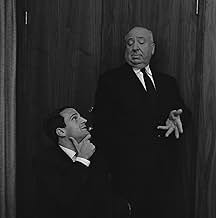IMDb RATING
7.3/10
7.3K
YOUR RATING
Filmmakers discuss how Francois Truffaut's 1966 book "Cinema According to Hitchcock" influenced their work.Filmmakers discuss how Francois Truffaut's 1966 book "Cinema According to Hitchcock" influenced their work.Filmmakers discuss how Francois Truffaut's 1966 book "Cinema According to Hitchcock" influenced their work.
- Awards
- 1 win & 1 nomination
Bob Balaban
- Narrator
- (voice)
Jean-Claude Brialy
- Self
- (archive footage)
- (uncredited)
Claude Chabrol
- Self
- (archive footage)
- (uncredited)
Jean-Luc Godard
- Self
- (archive footage)
- (uncredited)
Alfred Hitchcock
- Self
- (archive footage)
- (uncredited)
Vera Miles
- Self
- (archive footage)
- (uncredited)
Anny Ondra
- Self
- (archive footage)
- (uncredited)
Alma Reville
- Self
- (archive footage)
- (uncredited)
- Director
- Writers
- All cast & crew
- Production, box office & more at IMDbPro
Storyline
Did you know
- TriviaBoth Sir Alfred Hitchcock and François Truffaut could actually speak quite adequately in the language of the other, as can be heard in off camera moments. However neither felt confident enough, so they used Helen Scott, a bilingual Truffaut collaborator, to provide simultaneous translation.
- Quotes
Alfred Hitchcock: Silent pictures are the pure motion picture form. There's no need to abandon the technique of the pure motion picture, the way it was abandoned when sound came in.
- ConnectionsFeatures The Lodger: A Story of the London Fog (1927)
Featured review
Hitchcock/Truffaut (2015) was written and directed by Kent Jones. The movie is a documentary about the two-week period during which the young French filmmaker Francois Truffaut interviewed the older filmmaker Alfred Hitchcock. Truffaut--who greatly admired Hitchcock's work--was writing a book about Hitchcock. It was published in 1966 with the title "Cinema According to Hitchcock."
This long interview was sound recorded, but apparently not entirely filmed. So, often we are watching a still while the words are given as voice-over. We see clips of great Hitchcock and Truffaut movies, but usually I couldn't see the relationship between the words and the film clips.
Also, Hitchcock spoke English, and Truffaut spoke French, so each was hearing the other person's words through a interpreter. (Obviously, the interpreter was a professional. Still, unless you know both languages well, you can't tell whether each man is hearing the essence of the other man's words.)
Most of the movie consists of comments about Hitchcock, Truffaut, and the book given by famous film directors. These include Peter Bogdanovich, Kiyoshi Kurosawa, Paul Schrader, and Martin Scorsese.
I'm a movie buff, and I've reviewed over 600 movies for IMDb since 1999. However, I don't understand the intricate technical subtleties that film professors teach, and that were discussed in this movie. I felt as if I were outside, looking inside, watching professionals talk about their magic. I would have preferred less talking and more film clips, but director Jones wanted to give us talking heads instead. Of course, the heads that were talking were highly successful movie directors, so it's hard to complain. However, this is a better movie for highly knowledgeable film people. It was interesting enough for my wife and me, but I won't suggest that you seek it out unless you are really versed in cinema.
We saw this film at the wonderful Dryden Theatre in the George Eastman Museum in Rochester, NY. Naturally, because the movies discussed were meant for the large screen, the film clips work better on a large screen. However, the interviews will work just as well on a small screen.
This long interview was sound recorded, but apparently not entirely filmed. So, often we are watching a still while the words are given as voice-over. We see clips of great Hitchcock and Truffaut movies, but usually I couldn't see the relationship between the words and the film clips.
Also, Hitchcock spoke English, and Truffaut spoke French, so each was hearing the other person's words through a interpreter. (Obviously, the interpreter was a professional. Still, unless you know both languages well, you can't tell whether each man is hearing the essence of the other man's words.)
Most of the movie consists of comments about Hitchcock, Truffaut, and the book given by famous film directors. These include Peter Bogdanovich, Kiyoshi Kurosawa, Paul Schrader, and Martin Scorsese.
I'm a movie buff, and I've reviewed over 600 movies for IMDb since 1999. However, I don't understand the intricate technical subtleties that film professors teach, and that were discussed in this movie. I felt as if I were outside, looking inside, watching professionals talk about their magic. I would have preferred less talking and more film clips, but director Jones wanted to give us talking heads instead. Of course, the heads that were talking were highly successful movie directors, so it's hard to complain. However, this is a better movie for highly knowledgeable film people. It was interesting enough for my wife and me, but I won't suggest that you seek it out unless you are really versed in cinema.
We saw this film at the wonderful Dryden Theatre in the George Eastman Museum in Rochester, NY. Naturally, because the movies discussed were meant for the large screen, the film clips work better on a large screen. However, the interviews will work just as well on a small screen.
- How long is Hitchcock/Truffaut?Powered by Alexa
Details
Box office
- Gross US & Canada
- $260,430
- Opening weekend US & Canada
- $28,178
- Dec 6, 2015
- Gross worldwide
- $386,471
- Runtime1 hour 19 minutes
- Color
- Aspect ratio
- 1.78 : 1
Contribute to this page
Suggest an edit or add missing content



































